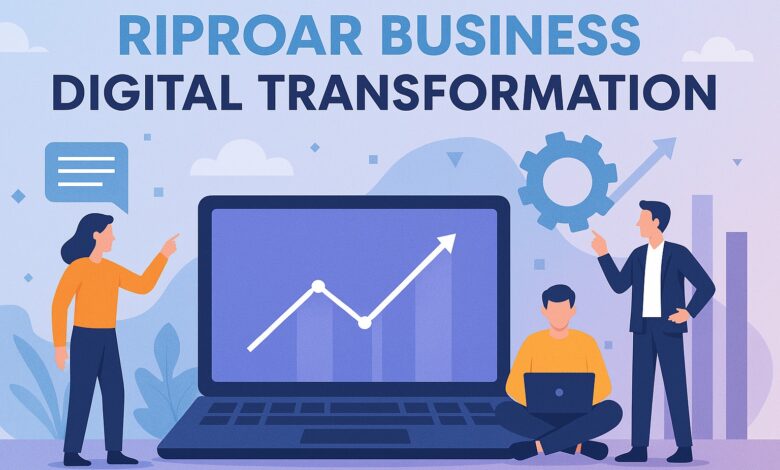Riproar Business Digital Transformation: Paving the Way for the Future of Business
Empowering businesses with advanced technologies and strategies to drive digital transformation and future growth.

In today’s fast-paced and highly competitive market, digital transformation has become a key factor for business growth and sustainability. Riproar business digital transformation is more than just a buzzword; it is a comprehensive process that enables businesses to innovate, streamline operations, and deliver exceptional customer experiences. In this article, we will explore the essential elements of digital transformation, focusing on how Riproar is shaping the future of business in the digital era.
Introduction: The Necessity of Digital Transformation in Business
Digital transformation is no longer a luxury for businesses—it’s a necessity. Companies that embrace digital technologies are better equipped to adapt to changing market demands, improve operational efficiency, and stay ahead of the competition. Riproar business digital transformation offers businesses the opportunity to modernize their operations and harness the power of technology to drive growth.
Through digital transformation, businesses can optimize their internal processes, enhance customer engagement, and develop new business models that are more agile and scalable. As more companies embrace digital strategies, the need for staying ahead in the digital transformation journey has never been greater.
The Core of Riproar Business Digital Transformation
The core of any digital transformation lies in the integration of new technologies, improved processes, and a shift in organizational culture. Riproar business digital transformation focuses on a holistic approach that combines technology with business strategy, helping businesses achieve their long-term objectives.
Embracing New Technologies
One of the key drivers of Riproar business digital transformation is the adoption of advanced technologies. Whether it’s cloud computing, artificial intelligence (AI), or blockchain, these technologies provide businesses with the tools to streamline operations and make data-driven decisions.
For instance, Riproar business online transformation often incorporates the use of AI to automate mundane tasks, enhance decision-making processes, and improve the customer experience. AI technologies can help businesses analyze vast amounts of data, uncover trends, and predict customer behavior. This level of data analysis enables businesses to personalize their offerings and deliver more targeted, effective solutions.
Streamlining Business Operations
A major aspect of Riproar business digital transformation is streamlining internal operations. By adopting cloud-based platforms, businesses can centralize their operations, reducing the complexity of managing different systems and applications. This not only improves efficiency but also fosters collaboration across departments and locations.
Automation is another important element. Business processes that were once manual and time-consuming can now be automated using various tools, such as robotic process automation (RPA) and AI-driven systems. This reduces human error, accelerates workflows, and frees up employees to focus on higher-value tasks.
Enhancing Customer Experience
In today’s market, customer experience is paramount. Businesses must go beyond basic service delivery and provide personalized experiences that meet the evolving expectations of their customers. Riproar business digital transformation enables businesses to do this by leveraging technology to gather insights into customer preferences, behaviors, and needs.
For example, through data analytics and AI, businesses can offer personalized recommendations, tailor marketing messages, and provide proactive customer support. This level of personalization creates stronger customer relationships, increasing brand loyalty and retention.
Key Technologies Driving Riproar Business Digital Transformation
Cloud Computing
Cloud computing is one of the cornerstones of Riproar business digital transformation. By moving to the cloud, businesses can store and access data remotely, ensuring that employees have the tools and information they need to work efficiently, regardless of their location. Cloud-based platforms also provide businesses with scalability, flexibility, and cost-efficiency, making it easier for them to scale up or down as needed.
Cloud technologies also enable businesses to implement software-as-a-service (SaaS) solutions, which eliminate the need for on-premise installations and maintenance. This allows businesses to adopt the latest tools and technologies without the high upfront costs and ongoing maintenance associated with traditional software.
Artificial Intelligence and Machine Learning
AI and machine learning are transforming the way businesses operate and interact with customers. AI-powered systems can automate routine tasks, such as data entry and customer inquiries, while machine learning algorithms can predict customer behavior, optimize business processes, and improve decision-making.
Riproar business digital transformation uses AI and machine learning to offer predictive analytics, which help businesses forecast trends and anticipate market demands. This level of insight allows businesses to stay proactive and ahead of competitors by making smarter, data-driven decisions.
Blockchain
Blockchain technology has gained significant traction in recent years, and its applications extend far beyond cryptocurrency. In the context of Riproar business digital transformation, blockchain is used to improve transparency, security, and efficiency in business transactions.
By leveraging blockchain technology, businesses can create secure, tamper-proof records of transactions, reducing the risk of fraud and improving trust with customers and partners. Blockchain also enables faster and more secure transactions, particularly in industries such as finance, supply chain, and healthcare.
Data Analytics
Data analytics is a critical component of Riproar business digital transformation, as it allows businesses to gather insights from vast amounts of data. By analyzing customer behavior, market trends, and operational performance, businesses can make informed decisions that drive growth.
Predictive analytics, a subset of data analytics, is particularly valuable for businesses looking to anticipate market changes and customer needs. By using predictive models, businesses can identify emerging trends and adjust their strategies accordingly, ensuring they remain competitive in a fast-changing market.
Overcoming Challenges in Digital Transformation
While the benefits of digital transformation are clear, businesses often face challenges when implementing new technologies. One of the main challenges is resistance to change. Employees may be hesitant to adopt new systems and processes, particularly if they are accustomed to traditional ways of working.
To overcome this, businesses must invest in training and support to ensure that employees are comfortable with new technologies. It is also crucial to have strong leadership that can drive the digital transformation process and foster a culture of innovation.
Another challenge is ensuring data security. As businesses collect and store more data, they must take steps to protect sensitive information. Implementing robust cybersecurity measures and complying with data privacy regulations are essential for mitigating risks and building customer trust.
Conclusion: The Future of Riproar Business Digital Transformation
In conclusion, Riproar business digital transformation offers businesses the opportunity to revolutionize their operations, improve customer experiences, and stay ahead of the competition. By embracing cutting-edge technologies such as cloud computing, AI, blockchain, and data analytics, businesses can unlock new growth opportunities and create more efficient, agile operations.
While the digital transformation journey can be challenging, the rewards are significant. Businesses that successfully navigate this transformation will be better positioned to adapt to changing market dynamics, build stronger relationships with customers, and achieve long-term success.



